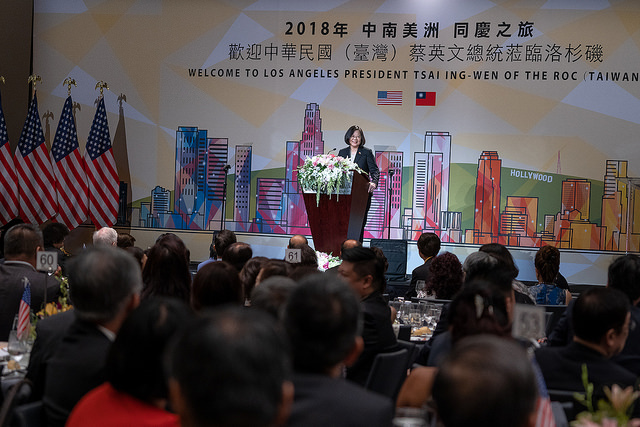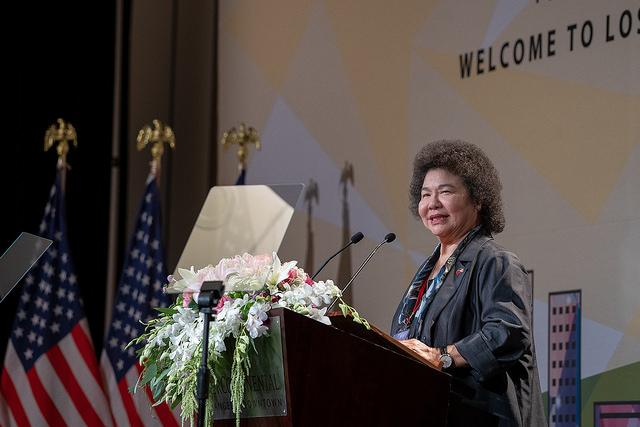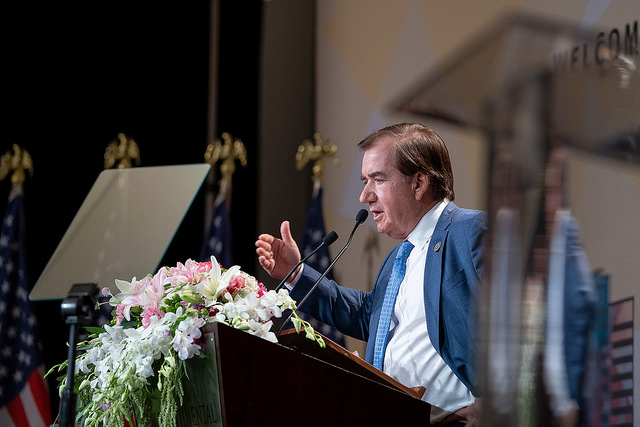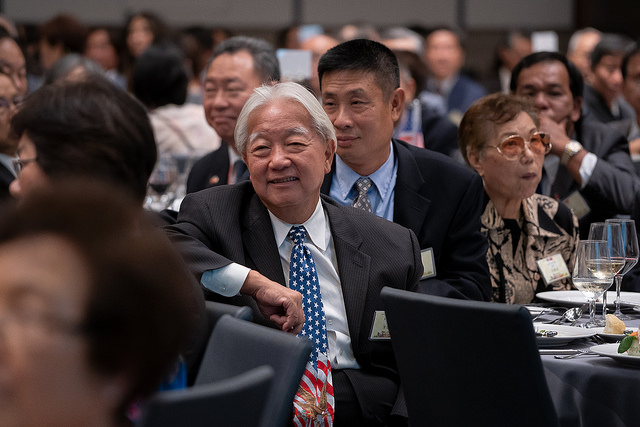News & activities
 News releases
News releases
President Tsai Ing-wen attended a banquet for expatriates in Los Angeles on the evening of August 12 local time (morning of August 13, Taipei time). She explained the government's commitment and achievements in strengthening Taiwan over the past few years by enhancing democracy, achieving justice and fairness, and creating an innovative economy. The president emphasized that every Taiwanese-American should be part of our efforts to strengthen Taiwan, and expressed hope that everyone will unite and give their all, because that's the only way Taiwan can forge its own path.
A transcript of the president's English remarks follows:
It's great to be here knowing that we have finally found a ballroom like this capable of holding so many of our friends from across Los Angeles. In fact, I think this is one of the largest banquets we have held in the United States, and I'm very pleased it could be right here in Los Angeles.
Before I begin, I want to recognize some of our special friends here with us tonight.
First is someone who needs no introduction. He's so popular in his constituency and the Taiwanese-American community that we have long considered him to be half Taiwanese. Of course, the fact that he loves to eat xiaolongbao (steamed pork dumplings) makes this even more convincing. I'm talking about Chairman Ed Royce (Chairman of the US House Committee on Foreign Affairs).
As I was saying to him a bit earlier, I had the opportunity to meet his wife Marie in Taipei in June. And you cannot find a couple that is more supportive of the Taiwan-US relationship and all the values we cherish. Thank you!
I also want to acknowledge Congressman Brad Sherman, who has always so warmly welcomed me to Los Angeles. I'm happy he still came, even though we are outside the 30th district (Congressman Sherman's district) this time. But Brad has long been more than a friend. If you take a look at his record, you will see the tremendous things he has done for Taiwan and our bilateral relationship. So, thank you, Brad.
Also with us tonight is [Congresswoman] Judy Chu, sitting next to me, a longtime member of the Congressional Taiwan Caucus. I had the pleasure of meeting her when I was running for the presidency in 2015 and again as president in 2016. I know she is a fixture in the Taiwanese-American community. And I would be remiss if I did not acknowledge her at this time here in Los Angeles. Thank you, Judy.
I also want to acknowledge all the dignitaries who are with us tonight. Of course, we also have a special guest. I don't really know whether you are a guest or not. You are always one of us. It's Chairman James Moriarty [Chairman of the American Institute in Taiwan (AIT)]. We're sorry he had to come all the way from Hawaii to Los Angeles this time to join us. But you can tell by his remarks the enthusiasm he feels for Taiwan. Under his leadership at AIT, our bilateral relationship has grown tremendously and we're happy he's here today with us.
Since my last visit to Los Angeles, a lot has happened in our relationship with the US. We have seen the approval of the first major arms sale by the Trump administration. Important legislation, including the Taiwan Travel Act, has passed thanks to our friends in Congress. And in June, we witnessed the opening of the new AIT compound in Taipei, a concrete symbol of the US commitment to Taiwan.
On trade, we have engaged in more substantive cooperation in areas from the New Southbound Policy to the digital economy. And in promoting people-to-people ties, we welcomed the expansion of the Global Entry program to include Taiwan earlier this year, which will make it easier for many Taiwanese to come visit the US.
These developments show that despite the unprecedented challenges we face from across the Strait to our freedom, democracy, and way of life, our relationship with the United States has never been stronger. This gives us confidence in our values and beliefs. And they show that in a community of like-minded nations, the people of Taiwan do not stand alone.
After all, the depth of our friendship with the US has always been reflected by the power of our values and resolve of our convictions. The freedom of speech, assembly, and the ability to select new governments through the ballot box, rather than force, is what brings our countries together, and what sets us apart from others.
I want to thank all of our friends from Congress, the Executive Branch, and AIT, as well as the Taiwanese-American community as a whole, for your continued support of Taiwan. Thank you. And I will now continue my remarks in Mandarin, and also in Taiwanese.
Following are translations of the portions of President Tsai's speech delivered in Mandarin and Taiwanese:
President Tsai mentioned that earlier, she received some sad news about a fire that broke out that morning at the Taipei Hospital under the Ministry of Health and Welfare in New Taipei City. Although there was an emergency evacuation, she said, some patients unfortunately died in the blaze, which is quite regrettable. The president expressed her condolences to the families of the deceased, and said she hopes the injured will recover soon. She said that although she was in transit, she heard the news very quickly, and already instructed the responding agencies to extinguish the fire and rescue the victims as quickly as possible.
The president stated that this marked her second visit to Los Angeles since she became president. The reception was just as warm and cheerful as the gathering two years ago, she said, but in a bigger venue with more people. She heard that many Taiwanese expatriates drove for many hours just for this event to cheer us on, and support the reforms the government has implemented over the past two years. The president then said the delegation could really feel the expats' approval and affection, for which she thanked them.
President Tsai then recalled her visit to Los Angeles in 2015 when she was running for office. She thanked everyone for their support, from the presidential campaign through winning the election, and including the government's current reform efforts. We remain committed to reforms, she said, but also acknowledged there were many challenges over the past two years. Throughout that process, she was grateful that so many people were rooting for the government.
The president then mentioned several previous banquets with Taiwanese expatriates in Los Angeles. When she attended the banquet in 2015, she said, she promised that if she became president, she would work for a stronger, more prominent Taiwan. In 2016, when she was in Los Angeles again soon after her inauguration, she told everyone that while reforms wouldn't happen overnight, she would lead Taiwan steadily forward, step by step. Now she was back in Los Angeles, and wanted to tell everyone about her administration's achievements over the past two years. "We're working really hard to fulfill our commitments," she said.
First, she said, in terms of enhancing democracy, Taiwan's democracy has continued to make progress over the past few years. After the Democratic Progressive Party won a majority in the Legislative Yuan in 2016, we initiated reforms to make the legislature more transparent. One of our most significant achievements was setting up a live-broadcast channel so that the public, including Taiwanese abroad, can watch Legislative Yuan proceedings in real time.
Last year, the president mentioned, the government amended the Referendum Act, removing past restrictions and returning the right to hold referendums to the people of Taiwan. We also established the Transitional Justice Commission earlier this year. Like South Africa, Germany, South Korea, and many other democratic nations, Taiwan is pursuing transitional justice, she said.
President Tsai said that we also recently saw the formal opening of Taiwan's National Human Rights Museum. The museum sites, where political prisoners were sentenced and imprisoned during the authoritarian era, have now become venues for human rights education. The president especially encouraged second- and third-generation Taiwanese-Americans in the audience to visit the museum. On their next trip to Taiwan, by walking through the two parks that are part of the museum, one on Green Island and one in Jingmei in New Taipei City, the president said they will gain an even deeper appreciation of Taiwan's democratic development.
President Tsai continued by saying that to strengthen Taiwan, the second task is achieving a more just and fair society. Three years ago, she had stressed to the Los Angeles expatriates that when the current administration took office, it would implement a fairer taxation system. So the government introduced reforms that reduce the tax burden on low and medium-income groups and wage earners.
The president said she told the public that she wanted to make it possible for young people to buy a house and live in urban areas, so her administration has been actively building social housing. Currently, she said, 22,000 units have been built or are under construction, and by 2020, the number of social housing units completed or under construction will reach 47,000.
Three years ago, President Tsai stated, she also pledged to establish a universal, affordable long-term care system, and our Long-term Care 2.0 Plan has been launched. Taiwan's grassroots communities are gradually setting up long-term healthcare systems, so the government will care for more and more people with diminished mental and physical abilities. The president believes that if we continue to promote the long-term care system alongside the National Health Insurance program, that system will make Taiwanese feel secure and proud.
President Tsai emphasized that enhancing democracy, creating a more just and fair society, developing a caring society, and setting up a comprehensive care system will help Taiwanese feel that their country is fair and supportive. At the same time, she said, the economy is an important focus of our reforms.
The president pointed out that over the past two years, we have expanded links with the ASEAN, South Asia, Australia, and New Zealand through our New Southbound Policy. Taiwan's exchanges with New Southbound countries in tourism, trade, industrial cooperation, and education are also progressing. Instead of being overly dependent on a single market, we are diversifying our international engagement.
President Tsai specially mentioned that flight routes between Taiwan and the US West Coast have also become more important over the past few years. Because innovative West Coast firms like Microsoft, Cisco, Google, and Amazon, have all set up or expanded their R&D centers in Taiwan, specializing in forward-looking fields like AI, the Internet of Things, and cloud computing.
Many Taiwanese-Americans have played a pivotal role behind the scenes in these investments, the president said. And our Asia Silicon Valley initiative has set up offices in Taoyuan in northern Taiwan and Silicon Valley in California, linking Taiwanese and global innovation communities, also with help from Taiwanese-Americans.
President Tsai then said that not long before she arrived in Los Angeles, Taiwan's Deputy Minister of Economic Affairs Kung Ming-hsin (龔明鑫) had just visited Silicon Valley. She also acknowledged that Taiwanese-Americans play an influential role in innovative industrial cooperation between the two sides of the Pacific. So the expertise and experience of the attendees, she said, as well as their connections, are just what Taiwan needs right now. She then invited everyone to lend a hand, and look for opportunities for Taiwan.
The president referred to the energy transformation in Taiwan, another inspiring example. Our efforts to develop offshore wind power have attracted large-scale investment by enterprises from Denmark, Germany, Canada, Australia, and Singapore. High-quality capital investments from the United States and other countries are improving Taiwan's job market, and giving our young people more and better job opportunities. More importantly, high-quality capital investments are speeding up economic restructuring and transformation through innovation.
New investments in fields like AI and green energy, the president said, show that our efforts have yielded preliminary results from promoting the "5+2 industrial innovation program," improving infrastructure, deregulation, and recruiting and retaining talent. After seven consecutive years, Taiwan's investment rate is no longer declining, while private investment will exceed NT$3 trillion for the first time.
President Tsai emphasized that new investment, new industries, and new job opportunities are appearing. Taiwan's industrial sector is reversing the trend toward hollowing out, while our economy is overcoming stagnation and sluggishness. So she expressed hope that everyone can work together to expand our innovation-based economy, a key to strengthening Taiwan's overall economy.
President Tsai then reminded all the attendees that Taiwan has never backed down from a challenge. Despite opposition of all kinds, we are moving forward with needed reforms. In the midst of geopolitical struggles, we are a stabilizing force in regional politics, holding fast to our free and democratic way of life, she said.
Over the past few years, the president stated, everyone has seen that US-Taiwan relations are getting better. But progress in Taiwan-US relations depends on the efforts of many Taiwanese-Americans. While our countrymen are abroad, their hearts are still with Taiwan, and they want to do things for Taiwan.
Whether in business or diplomacy, President Tsai emphasized, Taiwanese-Americans are never just spectators or cheerleaders, and there are many things they can do for their homeland. Taiwan's survival and development depend on the influence and support of Taiwanese-Americans. All of our compatriots on hand can play a role in strengthening Taiwan
President Tsai then said she was grateful to have a chance to share a meal with everyone. She thanked the attendees, and asked that they continue to provide support and encouragement. Reforms take time, she said, but if Taiwanese unite, there is nothing we can't do. So let's all roll up our sleeves, she said, and work together. Because that's the only way to change Taiwan for the better, and forge our own path into the future.
In closing, President Tsai thanked everyone for such a warm welcome, and also thanked the US government, the government of the State of California, the Los Angeles city government, and Americans everywhere for their help during the transit stop.
Also attending the expatriate banquet were AIT Chairman James Moriarty; United States House Committee on Foreign Affairs Chairman Ed Royce; Congressman Brad Sherman, Congresswoman Judy Chu; Secretary-General to the President Chen Chu; National Security Council Secretary-General David T. Lee (李大維); Foreign Minister Joseph Wu (吳釗燮); Minister Wu Hsin-hsing (吳新興) of the Overseas Community Affairs Council; ROC Representative to the United States Stanley Kao (高碩泰); Legislator Hsiao Bi-Khim (蕭美琴), Lee Chun-Yi (李俊俋), Chen Yi-Chieh (陳怡潔), Tsai Shih-Ying (蔡適應), Chou Chun-Mi (周春米), and Lai Jui-Lung (賴瑞隆); Chairperson Alan Thian (田詒鴻) of the Taiwan Center of Greater Los Angeles; and President Peter Luong (梁永泰) of the Chinese Consolidated Benevolent Association of Los Angeles.












